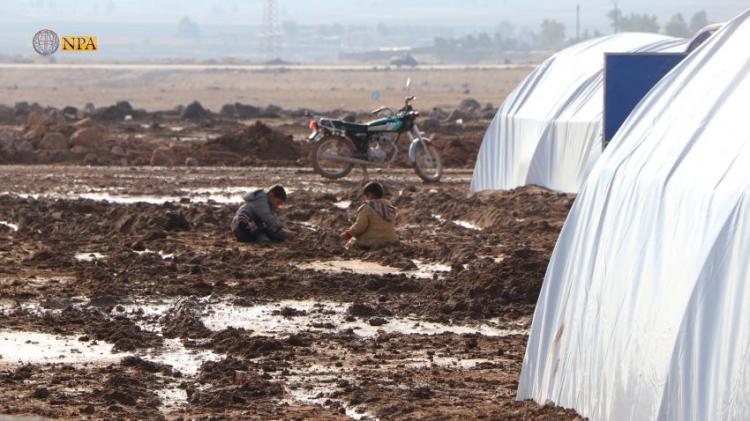Harsh winter conditions increase IDPs’ suffering in north-eastern Syria
Hasakah – North-Press Agency
Jindar Abdulqader
The wave of the influx of the internally displaced people from the areas of Sere-Kaniye (Ras al-Ain), Abu Rasin (Zergan) and Tal Tamr into Washo-kani camp, some 12 km west of Hasakah, north-eastern Syria, continues after the start of the construction process of the camp at the beginning of last November.
The increase of the suffering
In addition to the lack of support and the absence of international humanitarian organizations that withdrew based on political and military considerations, the suffering of the IDPs increases with the advent of winter, as heavy rains which fell during the past three days resulted in the sinking of tens of tents that weren't prepared with the required form, as a result of the increasing influx of the IDPs in light of the process of preparing the camp and not completing it.
North Press talked to Shathra Ahmad al-Hajji, an IDP woman from al-Hajji village in Tal Tamr countryside, she noted that they left their village after the Turkish military and its armed opposition groups expelled them from their homes about a month and a half ago. al-Hajji noted that they took refuge in one of the shelters (schools), then they were transferred into this camp: "When it rained, our tent was filled with water and our children were wet, they were without shoes, and we didn't have money to buy them, we couldn't sleep.”
Regarding her stay with her family in the camp and not returning to her village despite being from the Arab component, al-Hajji noted that the Turkish-backed armed groups have expelled the sheikhs who visited the village to inspect their needs and their desire to return to their homes, "threatening them that, if they don't leave, they will kill them,” as she said.
Al-Hajji also pointed out that, the Turkish-backed armed groups "looted wheat and barley, dismantled the doors and windows of the houses, and burned the furniture.”
For his part, Mohammad al-Ahmad, an IDP from the village of Umm al-Kheir, to the west of Tal Tamr said: "Our tent floated due to the heavy rain, the blankets and clothes became wet,” noting they had to get out of their tent and to sleep in the tent of their neighbors. “Our situation is still bad, they gave us blankets, sponges, some laundry needs, and some emergency items,” he added.
Adlah Mostafa Salman’s situation from the village of al-Dawoudiya isn't different from the rest of the IDPs in the camp, as the rain caused the float of her tent, to be forced to take out her belongings, saying: "We were flooded with rain and mud, we suffered a lot from the rain that fell this week, the water leaked into our tent, what can we do?” she wondered.
Upon leaving her village, Adlah left her house and her properties, to be subject to seizure by the Turkish-backed armed opposition groups. “We left everything behind, our livelihood and properties, we don't know what happened to them", she added, pointing out that they feared sending men to the village to inspect their properties for fears, "they would be kidnapped for ransom.”
Provision of services
Hassan Ahmad Yousef, an official in Washo-kani camp said that they receive about 100 families every day, noting that there are local organizations that provide support, Barzani Charitable Foundation has provided assistance, as well.
Yousef explained that, all the services provided to the IDPs "don't fulfill the purpose, because the camp needs a lot of support, especially it is winter time,” pointing out that the Autonomous Administration of north-eastern and its institutions provide the bulk of the aid, as he said.
Yousef noted that, with the start of the Turkish military invasion in north-eastern Syria, “international organizations withdrew from the region for unknown reasons", saying: "We send our message to the international organizations to consider the human content in Washo-kani camp.”
According to Yousef, there are about 700 tents in the camp now, where the number of families within the camp is about 800 with a number of individuals, estimated of about 5000 people.
The camp official noted that, the number of IDPs in the camp is subject to increase, pointing out that the lack of availability of the infrastructure has increased the suffering of the people, as working continues in the camp, as he stated.
According to North-Press reporter, the old sections of the camp were well prepared by laying the broken stones under the tents and putting stones and cement on the outskirts to prevent water leakage, in addition to delivering a good amount of needs to the IDPs in terms of heating, mattresses and food baskets.
Washo-kani or Washu-Kanni is the old name of today's Sere-Kaniye in Kurdish, Ras al-Ain in Arabic. Washo-kani was the capital of the Mitanni Empire, which stretched from Anatolia to Kirkuk in the 2nd millennium BC.

